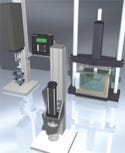First-Time Exhibitors
More than 450 companies will be exhibiting at MD&M Minneapolis 2006. In the next few pages, MPMN talks to some of the companies who will be exhibiting for the first time this year. Some are new to the medical field, some are long-time suppliers, but all are looking forward to meeting the show’s estimated 7000 attendees. Read on for more details on some of this year’s first-timers.
October 13, 2008
Originally Published MPMN October 2008
MD&M MINNEAPOLIS 2008
First-Time Exhibitors
Molding Component Provider Keeps Up with the New While Rebuilding the Old
|
Offering screw and barrel assemblies, Concor can also rebuild through-hardened tool-steel screws. |
The baby boomer generation has been a boon to suppliers and manufacturers in the medical device industry. However, the demand for new types of devices for this aging population and the development of new resins in recent years have, in turn, resulted in the need for novel molding equipment. Using this opportunity to its advantage, molding component and tooling provider Concor Tool and Machine (Hayward, WI) has put its experience to good use by designing and rebuilding mold tooling for these emerging applications.
Founded in 1980 as a provider of tooling and component parts for plastic molding equipment, Concor has been serving the medical industry since the early 1990s. But the sheer volume of OEM products geared toward baby boomers that has emerged—such as implants, grafting material, and devices for cardiac and orthopedic applications—has kept Concor increasingly busy in recent years developing original steel components to mold these products, according to Bill Talbot, Concor vice president.
Though it offers other materials, Concor specializes in producing steel components such as screws, barrels, end caps, and nozzle and tip assemblies. It also works with OEMs to incorporate their specific application requirements when designing mold tooling and accessories to enhance the efficiency of the manufacturer’s process. “We take the product being made and, using medical-grade materials, design components to produce efficient processing capabilities, [such as] minimizing scrap and downtime and providing higher product yield and reduced cycle times,” explains Talbot.
In addition to creating new components, Concor offers rebuilding and repair services as well as machine part conversions. Its tool-steel-screw-rebuilding process is an example of the company’s design capabilities. Rebuilding through-hardened tool-steel screws is more cost-effective than buying new screws, according to Concor, which also claims it is the only company with the capability to rebuild such screws. Most customers choose to keep a spare tool-steel screw available so that when the screw that is being used in press processing becomes worn, they can immediately send the screw to Concor for rebuilding. By then putting the spare screw into use, they experience no downtime, according to the company.
This rebuilding process is exclusive to Concor’s tool-steel screws because of the chemical make-up of the screw and the heat-treating process used to ensure that it will not crack under stress. Furthermore, a typical rebuild process requires that the screw be weldable. A welding rod specially designed for the chemistry of the steel is applied to the screw. The screw is straightened, heat-treated, and then ground to exact specifications.
Concor can also rebuild other types of screws as small as 14 mm. In addition, the company’s rebuild and repair services extend to a range of other molding equipment components, from barrels and drive bushings to pistons and tie bars. Upsize, downsize, and thermoset component conversions are also available from the company.
Booth #433
System Manufacturer Puts Two and Two Together
|
TestResources applies modularity to a range of testing products, including systems for tissue testing and medical and orthopedic devices. |
For TestResources (Shakopee, MN), the driving design principle behind its test systems is modularity. “The idea was to establish a business with a more flexible product line—we call it modular—where we can configure machines with a variety of components combined in different ways to meet each customer’s set of needs,” explains sales manager Ted Parrish.
Using modularity as its mantra since its inception 10 years ago, TestResources applies this design philosophy to a range of testing products, including systems suited for biomedical testing of tissues and medical and orthopedic devices. The advantages of such an approach revolve primarily around cost reductions enabled by standardization and the avoidance of ‘overbuilding’ a system for a specific customer’s needs, according to the company. Flexibility, customization, and the ability to easily augment systems to accommodate developing needs are also potential benefits.
Specializing in all-electric units, TestResources offers static and dynamic materials test, torsional test, and multiaxial test systems, in addition to a bevy of associated accessories. “In most of our systems, we use an all-electric type of system instead of a hydraulic system, which is generally preferred for biomedical testing applications,” Parrish says. “They are cleaner, less intrusive on the facility, and consume less power for the [amount of] work that they do.” Models for tension, compression, and fatigue testing are among the company’s main product lines.
While exhibiting at MD&M Minneapolis for the first time, TestResources will be highlighting the features of its 800L series, which include a compact footprint and versatile design. Users can also opt to pair the 800L with the company’s biobath in order to simulate in vivo conditions for more-accurate product testing. The systems typically test such products as biomaterials, orthopedic implants, tissues and artificial ligaments, and medical devices like catheters, heart valves, and stents.
“It’s a fun business to serve because it’s easy to relate to the products that our customers are testing, [as well as] what they do, how they help people, and how our machines help to further their purposes,” Parrish says.
Booth #351
Electronic Components Provider Branches into Medical Connectors
Qualtek Electronics Corp. (Mentor, OH) owes its success in part to the company’s habit of watching for and picking up new product lines and technologies targeted at the markets it serves. The company started out by manufacturing fan accessories but will soon be introducing a line of push-pull connectors for medical devices at MD&M Minneapolis.
Since founding the company in 1980, company president John Hallums has steadily expanded Qualtek’s offerings every few years. From fan accessories, the company moved on to add such electronic products as ac receptacles, power cords, and cable assemblies to its catalog. Having monitored the growth of the medical industry for some time, Qualtek has identified it as one of the largest potential growth areas and has therefore increased its offerings to this market. In recent years, the company has built on its experience with RoHS-compliant power cords to offer customers other RoHS-compliant product lines, including heat-shrink tubing and electromagnetic interference filters, which can be used in medical devices.
“The medical industry is a very strong, demanding market in the United States, and a major focus for Qualtek,” says Laura Yano, operations supervisor. “As customers are always looking for innovative, less-expensive products, our ever-expanding hospital-grade offerings are available from stock to meet these demands.”
Helping support and sustain its product line expansion is the company’s physical growth worldwide. Since 1980, Qualtek has opened facilities in Hong Kong, Shanghai, Taiwan, and Mexico. Equipped with a range of automation equipment and technologies, these global operations enable the company to offer services for component sourcing and turnkey projects.
Booth #138
Microtool Maker Markets Tiny Tools to Big Industry
|
Midwest Industrial Tool Grinding supplies microtooling to medical device manufacturers. |
At its founding in 1993, Midwest Industrial Tool Grinding Inc. (MITGI; Stewart, MN) was a one- or two-person custom manufacturer and regrinder of cutting tools. Today—13 years and a major capital expansion later—the company has become a round-the-clock operation that supplies microtooling, developing products, and customer specialty tools to medical device manufacturers in Minnesota, the United States, and beyond.
MITGI began primarily as an industrial tool grinding company, regrinding drill bits and end mills, which are similar to router bits. The company focused on the precision metals industry, supplying such customers as 3M, Hutchinson Technology, and other metal shops. Meanwhile, the firm branched into the medical device manufacturing area.
“We began making prototype tooling for customers through word of mouth,” remarks Jeff Streich, MITGI’s customer service representative. “Our quality impressed people, and we continued to get more work in this field and more referrals through word of mouth. In 2003, we began a concentrated effort to move more of our work into this area, as we were having success and doing well in the medical field. This sector has continued to grow and is doing very well for us.”
As part of its drive to expand into the medical device manufacturing industry, the company will exhibit at MD&M Minneapolis for the first time, highlighting its entire line of customer specialty products, including medical tooling. Specializing in microtooling, the company offers all types of micro end mills and micro drills, including extended-reach and special-geometry models. It manufactures end mills as small as 0.003 in. in diameter.
Providing tooling for arthroscopic surgery instruments, for modifying implants such as pacemakers, and for other medical devices, MITGI manufactures tools with tight tolerances and repeatability. Tool consistency, in turn, translates into reduced setup times for operators manufacturing parts. By visiting customer facilities and understanding customers’ manufacturing goals, the company helps design tools that can meet their needs. It maintains complete documentation, including in-house prints, for all the tools it ships, enabling the company to correct problems that may arise and address customer concerns.
The company’s pursuit of precision manufacturing has paid off. In 2005, founder Jim Schaufler more than doubled the size of his facility, adding three CNC robotic tooling machines to the two that were already in operation. He also widened his customer base and began to increase the firm’s workforce. For his efforts, Schaufler was honored with the Southwest/Central Minnesota Entrepreneur of the Year award in 2006.
“We’ve really gotten into the medical field,” notes Schaufler. “I don’t think there is anyone in the state doing what I am doing.”
Booth #856
Copyright ©2008 Medical Product Manufacturing News
You May Also Like





